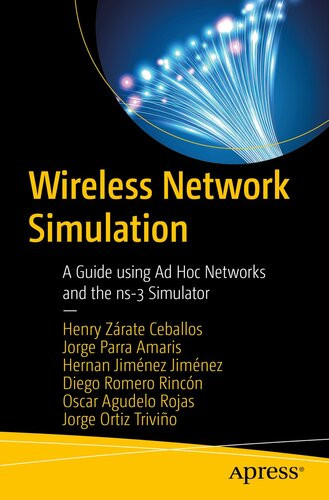

Most ebook files are in PDF format, so you can easily read them using various software such as Foxit Reader or directly on the Google Chrome browser.
Some ebook files are released by publishers in other formats such as .awz, .mobi, .epub, .fb2, etc. You may need to install specific software to read these formats on mobile/PC, such as Calibre.
Please read the tutorial at this link: https://ebookbell.com/faq
We offer FREE conversion to the popular formats you request; however, this may take some time. Therefore, right after payment, please email us, and we will try to provide the service as quickly as possible.
For some exceptional file formats or broken links (if any), please refrain from opening any disputes. Instead, email us first, and we will try to assist within a maximum of 6 hours.
EbookBell Team

5.0
70 reviewsLearn to run your own simulation by working with model analysis, mathematical background, simulation output data, and most importantly, a network simulator for wireless technology. This book introduces the best practices of simulator use, the techniques for analyzing simulations with artificial agents and the integration with other technologies such as Power Line Communications (PLC). Network simulation is a key technique used to test the future behavior of a network. It’s a vital development component for the development of 5G, IoT, wireless sensor networks, and many more.
This book explains the scope and evolution of the technology that has led to the development of dynamic systems such as Internet of Things and fog computing. You'll focus on the ad hoc networks with stochastic behavior and dynamic nature, and the ns-3 simulator.
These are useful open source tools for academics, researchers, students and engineers to deploy telecommunications experiments, proofs and new scenarios with a high degree of similarity with reality. You'll also benefit from a detailed explanation of the examples and the theoretical components needed to deploy wireless simulations or wired, if necessary.
What You’ll Learn
Review best practices of simulator uses Understand techniques for analyzing simulations with artificial agents Apply simulation techniques and experiment design Program on ns-3 simulator
Analyze simulation results Create new modules or protocols for wired and wireless networks
Who This Book Is For
Undergraduate and postgraduate students, researchers and professors interested in network simulations. This book also includes theoretical components about simulation, which are useful for those interested in discrete event simulation DES, general theory of simulati